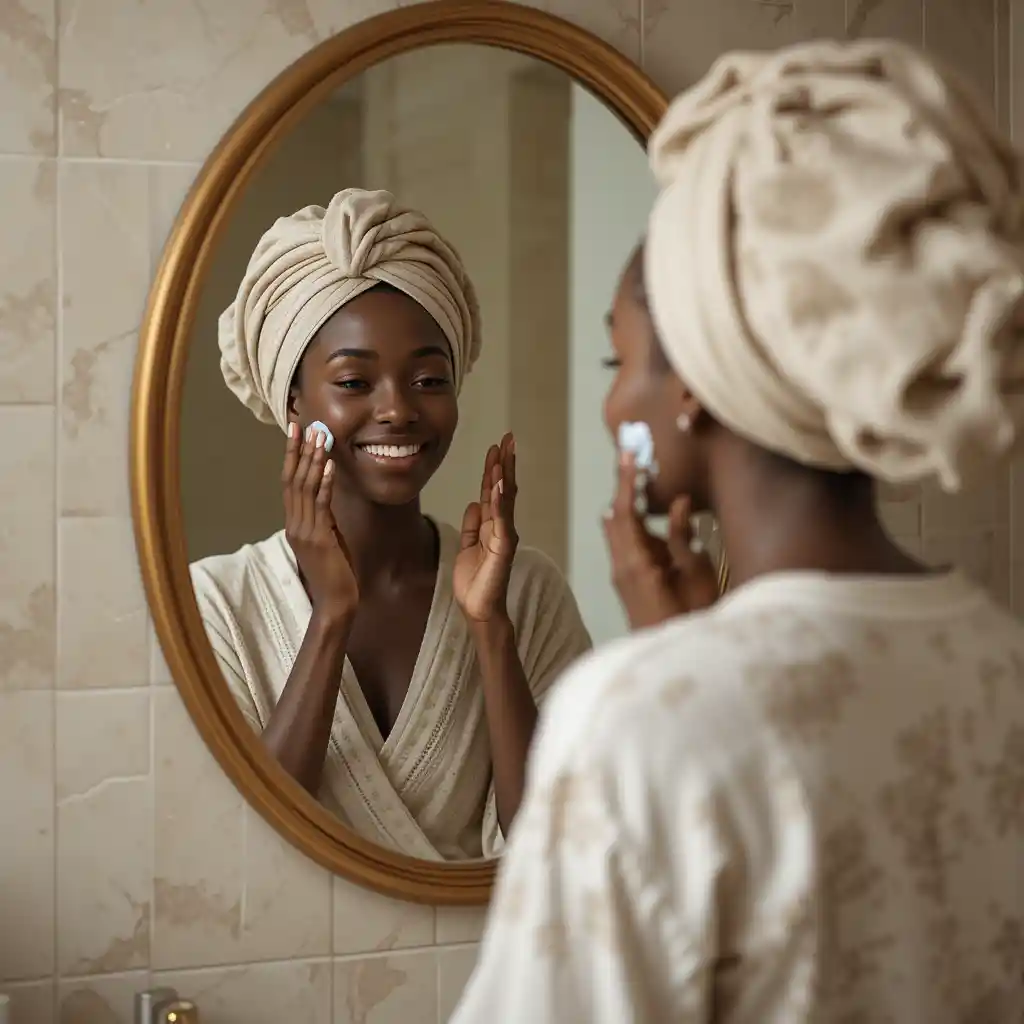While facial oils are beloved for their glow-boosting hydration, the real magic of anti-aging skincare lies in powerful, active ingredients that go deeper. From smoothing fine lines to firming skin and evening out your complexion, these non-oil ingredients deliver real, visible results, if you use them correctly.
In this post, you’ll discover the most effective non-oil anti-aging skincare ingredients, how they work, how to use them safely, and how to build them into a glowing, age-defying routine.
What Causes Premature Aging in Skin?
Before we dive in, let’s understand what leads to signs of aging in the first place:
- Loss of collagen and elastin, which support firmness and bounce
- Oxidative stress from UV rays, pollution, and lifestyle factors
- Skin barrier damage that leads to dehydration and sensitivity
- Slower cell turnover, causing dullness, roughness, and wrinkles
- Hormonal shifts and inflammation, which affect skin texture and elasticity
The right skincare ingredients can help prevent, delay, and even reverse some of these signs, especially when used early and consistently.
The Best Anti-Aging Skincare Ingredients That Aren’t Oils (With Cautions)
These ingredients are ideal for smoothing fine lines, boosting radiance, improving skin tone, and firming up aging skin, but each comes with its own usage guide.
1. Retinol (Vitamin A)
One of the most researched anti-aging ingredients available.
- What it does: Boosts collagen, smooths fine lines, fades spots, improves texture.
- How to use: Start with a pea-sized amount, 1–2x a week at night, gradually increasing.
- Caution:
- May cause peeling, dryness, or sensitivity
- Avoid during pregnancy
- Always follow with SPF the next morning
2. Bakuchiol (Natural Retinol Alternative)
A plant-based alternative to retinol that offers similar results without irritation.
- What it does: Increases collagen, smooths wrinkles, firms skin
- How to use: AM or PM; pairs well with niacinamide or hyaluronic acid
- Caution:
- Still do a patch test when combining with exfoliants
3. Vitamin C (Ascorbic Acid)
A brightening, firming antioxidant that protects skin from free radicals.
- What it does: Evens tone, boosts collagen, brightens dullness
- How to use: Apply in the morning under SPF
- Caution:
- Can oxidize quickly, choose stable formulas
- May sting if skin is compromised
4. Niacinamide (Vitamin B3)
A gentle multitasker that works for nearly every skin type.
- What it does: Improves elasticity, reduces pores and redness, fades discoloration
- How to use: AM or PM; combine with almost any active
- Caution:
- High concentrations (10%+) can cause flushing in rare cases
5. Peptides
Short chains of amino acids that signal your skin to produce more collagen.
- What they do: Firm skin, reduce wrinkles, smooth texture over time
- How to use: Apply via serum or moisturizer daily
- Caution:
- Be patient because results are gradual, not immediate
6. Hyaluronic Acid
A hydration hero that plumps the skin and reduces the appearance of fine lines.
- What it does: Draws moisture into skin and retains it
- How to use: On damp skin, followed by moisturizer
- Caution:
- In dry climates, seal with an oil or balm to avoid moisture loss
7. Ceramides
Natural lipids that maintain the skin’s moisture barrier.
- What they do: Lock in moisture, protect against environmental damage
- How to use: In creams and moisturizers, especially after actives
- Caution:
- None and is very well-tolerated and ideal for barrier repair

8. Coenzyme Q10 (CoQ10)
A powerful antioxidant that supports cellular energy and fights oxidative stress.
- What it does: Firms skin, boosts elasticity, protects from sun damage
- How to use: In serums or moisturizers, morning or night
- Caution:
- Avoid pairing with benzoyl peroxide (may deactivate)
9. Alpha Hydroxy Acids (AHAs: Glycolic, Lactic, Mandelic)
Exfoliating acids that smooth skin and promote cell turnover.
- What they do: Brighten dullness, smooth texture, fade fine lines
- How to use: 1–3x per week in peels, toners, or masks
- Caution:
- Can increase sensitivity to sun
- Avoid layering with retinol on the same night
10. Polyglutamic Acid
A hydration powerhouse that works even better than hyaluronic acid.
- What it does: Plumps skin, smooths fine lines, enhances radiance
- How to use: After toner, before moisturizer
- Caution:
- Generally safe for all skin types
11. Green Tea Extract (EGCG)
Antioxidant-rich and calming, great for reactive or acne-prone skin.
- What it does: Neutralizes free radicals, reduces inflammation
- How to use: In toners, creams, or serums
- Caution:
- Choose stabilized extracts for maximum effectiveness
12. Caffeine
A temporary tightening and depuffing ingredient often found in eye creams.
- What it does: Reduces swelling, brightens under-eyes
- How to use: Use in the morning
- Caution:
- Results are short-term; doesn’t treat wrinkles long-term
13. Resveratrol
An antioxidant found in grapes and berries that protects skin over time.
- What it does: Defends against environmental aging and collagen loss
- How to use: At night, in serums or moisturizers
- Caution:
- May cause tingling on very sensitive skin
How to Build an Anti-Aging Routine With These Ingredients
You don’t need to use every ingredient. A simple, smartly layered routine is more effective than an overwhelming one.
Morning:
- Cleanser
- Vitamin C serum
- Hyaluronic acid
- Niacinamide (optional)
- Moisturizer with peptides or ceramides
- Sunscreen
Night:
- Cleanser
- Exfoliating acid (2–3x/week) or retinol
- Moisturizer with peptides or CoQ10
- Optional: Bakuchiol or resveratrol serum
Tips for Long-Term Results
- Start slow and patch test new actives
- SPF is non-negotiable – your best anti-aging ally
- Hydration matters – drink water and eat skin-friendly foods
- Sleep + stress management – for smoother skin
- Consistency over complexity – keep your routine sustainable
Final Takeaways
- Anti-aging skincare is about more than just oils, it’s about deep-acting ingredients that repair, renew, and protect your skin.
- Choose ingredients that suit your skin type and concerns.
- Combine hydration, antioxidants, collagen-boosters, and sun protection for the best results.
- A simple, well-structured routine with patience and consistency will transform your skin over time.
Frequently Asked Questions (FAQs)
Q: Which ingredient is best for beginners?
Niacinamide and hyaluronic acid are gentle yet effective starting points.
Q: Can I mix actives like retinol and vitamin C?
Unless formulated together, it’s best to use vitamin C in the morning and retinol at night.
Q: What age should I start using anti-aging products?
Prevention is key, start in your mid-to-late 20s with antioxidants and SPF, and incorporate stronger actives in your 30s and beyond.
YOU MAY ALSO LIKE
- Longevity Foods: What Ancient Civilizations Ate for Vitality & Strength

- How Seasonal Living Boosts Healthspan: Eating, Moving, and Resting with the Seasons

- Longevity as a Lifestyle: How to Live Longer, Healthier, and More Vibrantly

- The Secret to Longevity: How to Live Longer, Healthier, and Happier

- The Ancient Head-to-Toe Self-Care Ritual for Longer Hair & Glowing Skin (Inspired by Timeless Beauty Traditions)

BROWSE FOR MORE
Leave a Reply